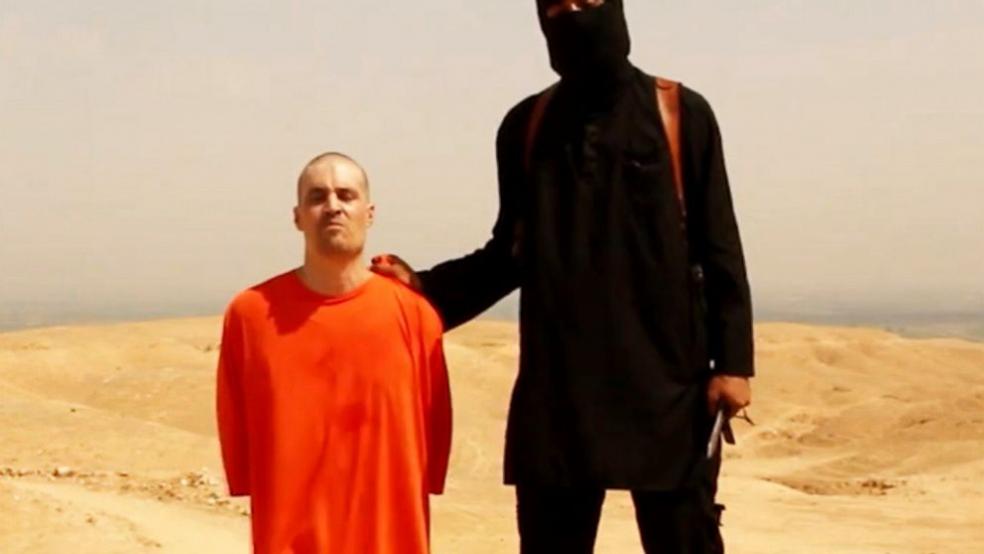Colin Powell is an American hero.He served two combat tours in Vietnam, and rose to become the first African-American Secretary of State, National Security Advisor, and Chairman of the Joint Chiefs of Staff. But the doctrine that bears his name – the Powell Doctrine – is a disaster. That idea of American power has contributed to U.S. passivity leading to (among other things) the brutal execution of American journalist James Foley. That is why it is – finally – on the way out.
The Powell Doctrine is somewhat of a misnomer: It’s actually mostly the Weinberger Doctrine, articulated by President Reagan’s former Secretary of Defense and refined by Powell afterwards. It says that American military power should not be used except overwhelmingly and as a last resort, with a clear political objective and exit strategy in mind. It evolved conceptually as a reaction to some of the perceived failures of the Vietnam War, such as shifting, vague political goals and artificial constraints on the use of force.
Related: James Foley Did Not Die in Vain
For a while, it seemed to make sense. The Gulf War illustrated how overwhelming airpower and ground forces could achieve a decisive strategic victory cleanly and quickly. … Then, GET OUT. No endless death-by-a-thousand Kalashnikovs this time - we had a new normal of how to fight wars, and it worked.
That Saddam had configured his army to be uniquely vulnerable to just this sort of warfare was, of course, beside the point. As was the fact that the “clear objective” got muddy very quickly: the Shia in Iraq’s south, egged on by the White House, rose up against Saddam’s rule and were massacred. Or that the Kurds required immediate, somewhat vague American assistance, to go with their vague political status, and that the U.S. would spend the next decade in low-level aerial warfare over Iraq’s no-fly zone for somewhat vague reasons. Vague, but necessary – the sort of support the Shia expected but didn’t get.
The Powell doctrine was already junk. But it was most damned by the subsequent post-Iraq crises: Bosnia and Rwanda. How the U.S. should interfere in complex, escalating genocides, rooted in decades or centuries old ethnic feuds was not nearly as clean-cut as in the Gulf War. So we didn’t interfere, which seemed hard-nosed and Powell-esque at the time but didn’t really reflect that well on America in hindsight.
Related: Obama’s 3 Options for Bringing Foley’s Killer to Justice
The Powell doctrine survived the ‘90’s genocides, though. It recused itself somewhat after the initially successful invasions of Iraq and Afghanistan, but came back with a vengeance when they went south in 2004 and 2005. The Iraq disaster – or at least the (currently) first “disaster” phase from 2004-2007 – resurrected some of the haunting questions about Vietnam: What, specifically, are we supposed to be doing? What nebulous outcome are we trying to achieve? And why don’t we have more men?
Many of these criticisms formed the backbone of the Obama administration’s foreign policy. “Don’t do stupid stuff” is essentially a distillation of the Powell Doctrine, a reaction to the ambitious, vague, nation-building in hate-soaked conflicts that had so soured the country on Bush’s plans for a democratic Middle East. More elegant was the administration’s catchphrase “Smart Power,” which suggested a more thoughtful, discriminating blend of diplomacy, trade, and occasionally force, in many fewer locations. It matched a public that was weary of war, and strongly opposed to more conflicts abroad.
However, the public also now views this policy as a disaster. A significant majority disapproves of Obama’s handling of foreign affairs, prompted by the cavalcade of disasters in Syria, Iraq, Ukraine, Libya, Gaza, Egypt, whatever’s happening in Mali at the moment, and China’s ongoing Mexican standoff with virtually all of its maritime neighbors. Each fresh disaster reinforces the view that Obama is passive in the face of action, and that passivity is feeding the chaos.
Related: Failure to Rescue Foley Shows Special Ops Limitations
It’s not entirely his fault. The Obama administration would argue, rightfully, that these conflicts are complicated and not easy to solve. It didn’t intervene forcefully in Syria to arm the moderates because it was complicated. It didn’t follow-up in Libya because it was complicated. Ukraine is REALLY complicated, and Putin’s intimidating in person.
That’s been the entire problem with Obama’s foreign policy and with the Powell Doctrine from the beginning -- most problems are complicated. That’s why they’re problems. Unless you have an enemy who’s read the script, like Saddam in 1990, the result of your doctrine is going to be doing a lot of nothing. When you’re the superpower, nothing feeds disaster. Nothing in Syria fed the Islamic State (ISIS), which grew and metastasized until it massacred Yazidis and beheaded the American journalist James Foley, and thus couldn’t be ignored any more.
The White House finally understands this, and has, however post-iceberg, begun to change course. President Obama’s announcement that the Iraq operations were going to be a “long-term project” to ensure that Islamic State militants could not “cripple a country” was a welcome dose of reality. Not because anybody wants a war, especially a long war; but simply because some problems are complicated. In crises like Rwanda and Darfur and now Iraq, the Powell Doctrine doesn’t help us much. America can be hurt anyway. That’s why Obama has – rightfully – moved on.
Top Reads from The Fiscal Times:





